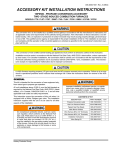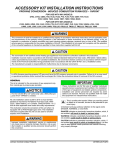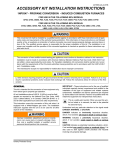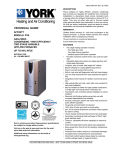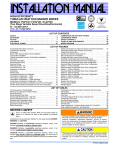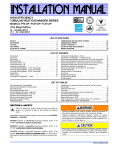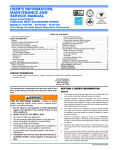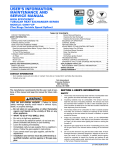Download Unitary products group PT9-UP Unit installation
Transcript
67404 / 035-20507-001 Rev. D (0205) ACCESSORY KIT INSTALLATION INSTRUCTIONS 1NP0580 - PROPANE CONVERSION ACCESSORY TWO- STAGE INDUCED COMBUSTION FURNACES MODELS: PT9 / FL9T / FC9T / GM9T / PV9 / FL9V / FC9V / GM9V / XYF9S / XYF9V PT8 / FL8T / FC8T / GM8T / PV8 / FL8V / FC8V / GM8V / XYF8S / XYF8V This conversion kit is to be installed by a qualified service agency in accordance with the manufacturer's instructions and all applicable codes and requirements of the authority having jurisdiction. If the information in these instructions is not followed exactly, a fire, an explosion or production of carbon monoxide may result causing property damage, personal injury or loss of life. The qualified service agency is responsible for the proper installation of this kit. The installation is not proper and complete until the operation of the converted appliance is checked as specified in the manufacturer's instructions supplied with the kit. The conversion of new certified central heating gas appliances must conform to directions outlined in this instruction. Installation must be made in accordance with the National Fuel Gas Code, ANSI Z223.1-latest edition, unless superseded by local codes. For Canadian installations, the conversion shall be carried out in accordance with the requirements of the Provincial authorities having jurisdiction and in accordance with the CAN1-B149.1 and .2 installation codes. The manufacturer accepts no responsibility for malfunctions due to improper conversions. Lo-NOx furnaces requiring propane (LP) gas must have the NOx screens removed prior to operation. Failure to do so may result in operational problems and/or reduced heat exchanger life. Follow the instructions below for removal of the NOx screens. GENERAL CONTENTS OF KIT This kit is intended for the conversion of new equipment only, from natural gas to propane gas operation. DESCRIPTION Propane Conversion Label Gas Line Pressure Switch Tapped Gas Pipe Nipple Main Burner Orifices Wire Harness 80% (1/4” Terminals) Wire Harness 90% (1/4” Terminals) Installation Instructions Valve Spring Kit All unit installations above 2,000 ft. must be field derated as required by the National Fuel Gas Code, ANSI Z223.1 (latest edition), or in Canada, CAN/CGA B149.1 or .2 and all other applicable local codes and utility requirements. This instruction covers the conversion of this unit when it is equipped with a White- Rodgers gas valve. The installation instruction supplied with the unit is to be used for all other aspects of the installation. An overpressure protection device, such as a pressure regulator, which conforms to the National Fuel Gas code, ANSI Z223.1 (U.S.) or CAN- B149.1 or .2 (Canada) and acts to limit the downstream pressure to value that does not exceed 0.5 PSI (14" w.c.), must be installed in the gas piping system upstream of the furnace. Failure to do so may result in a fire or explosion or cause damage to the furnace or some of its components. Unitary Products Group PART NUMBER 035-11635-000 024-27688-XXX 029-22152-000 029-20423-056 373-20975-001 373-20976-001 035-20507-001 025-38943-000 QTY 1 1 1 6 1 1 1 1 FURNACE CONVERSION The gas supply shall be shut off prior to disconnecting the electrical power, before proceeding with the conversion. 1. Remove the upper access door. On 90+ AFUE units, remove the burner box cover. 2. Carefully remove the wires from the gas valve and note their location so they may be properly replaced. Remove the screws that hold the manifold to the manifold bracket and slide the manifold off the burners. On 90+ AFUE units, the manifold is retained by two screws at the bottom and hooks in at the top of the burner box. 67404 / 035-20507-001 Rev. D (0205) 3. Remove the main burner orifices from the manifold and retain for future use. 4. Install the propane main burner orifices in the manifold and tighten them. After installing a propane orifice in each location, any leftover orifices may be discarded. 5. Reinstall the manifold in the assembly by reversing the removal process. 6. Reconnect the wires to the proper terminals on the gas valve. 12. Install the propane gas conversion label as described in the labels section of this instruction. 7. When installing gas piping on 80% AFUE units, insert tapped gas pipe nipple (supplied with kit) into inlet fitting of gas valve. If using the right side cabinet knock out, the nipple can be either be installed before or after making the u-bend. On 90% AFUE units, install an elbow into the inlet fitting on the gas valve and then install the tapped gas pipe nipple. 13. Refer to test and adjustments on the next page to property adjust to low fire and high fire manifold pressures. 8. Install (thread) the gas line pressure switch (supplied with kit) into the 1/8 NPT tapped hole in nipple applying pipe dope to the switch fitting prior to installation. Tighten the switch making sure the connection does not leak. NOTE: The gas line pressure switch will cause the furnace to lock out if the gas supply pressure drops below 6” w.c. The ignition control will display a fault code 7 and will reset after one hour. 9. Disconnect the purple wire from the flame sensor. 10. Using the appropriate wire harness (supplied with kit) connect the purple wire from the flame sensor into the insulated male connector; connect the two 1/4” insulated terminals to the pressure switch; and connect the remaining insulated terminal to the flame sensor. 11. Replace the high fire gas valve regulator spring only using the instruction sheet packed in the envelope with the spring. 14. Refer to the unit installation instructions to complete the installation. ORIFICE SIZE SELECTION A number of factors determine the correct orifice usage for your application. These factors include the original orifice sizing, BTU content of the gas and the altitude. For propane (LP) applications, Use Table 1 for burner orifice part numbers. Use Table 2 to select the proper high altitude orifice size. Table 1: Orifice Part Numbers BURNER ORIFICES Size # Source 1 Part Number 54 029-20423-054 55 029-20423-055 56 029-20423-056 57 029-20423-057 58 029-20423-058 59 029-20423-059 60 029-20423-060 EXAMPLE: If your unit has a #56 orifice, as standard for propane, and a heating gas value of 2516 BTU/CU.FT., at an altitude of 7,000 feet, a #58 orifice will provide the correct firing rate. REGULATOR COVER SCREW PLASTIC REGULATOR ADJUSTMENT SCREW REGULATOR SPRING Low fire manifold pressure is 4.0” w.c. Do not replace the low fire gas valve regulator spring. Refer to Figure 3 in the Instructions that came with the LP Gas Conversion Kit for gas valve pressure regulator locations. DO NOT CHANGE SPRING ON LOW FIRE PRESSURE REGULATOR FIGURE 1 : 36G 2-Stage Model 2 Unitary Products Group 67404 / 035-20507-001 Rev. D (0205) Table 2: Altitude/Propane (LP) Gas Heating Value Orifice Selection PROPANE GAS HEATING VALUE (MANIFOLD PRESSURE 10.0" W.C.) PROPANE ORIFICE @ SEA LEVEL 2516 BTU/CU.FT. RECOMMENDED ORIFICE ALTITUDE (FT. ABOVE SEA LEVEL) 0 2,000 3,000 4,000 5,000 6,000 7,000 8,000 9,000 10,000 54 54 54 55 55 55 55 55 56 56 56 55 55 55 55 55 56 56 56 56 56 57 56 56 56 56 57 57 57 58 59 59 60 TEST AND ADJUSTMENTS 8. The following tests must be performed at the time of conversion following completion of the installation. Make sure both gas and power supplies are shut off before proceeding. 1. Connect a manometer to the pressure tap on both the inlet and outlet side of the gas valve. Connect a power supply and a propane gas supply to the unit, if not already connected. On 90+ AFUE models, refer to unit installation instructions for proper procedure for connecting manometer to furnace. 2. Turn on the propane gas supply and bleed air from the gas supply lines at a point as close to the inlet of the gas valve as is practical. 3. Turn the gas valve control switch to the “ON” position. 4. Make sure unit electrical disconnect switch is in the OFF position. 5. Set the room thermostat to call for heat. 6. Turn unit electrical disconnect switch to ON. The combustion blower should start and the hot surface igniter should start glowing. 7. After air has been purged from the gas supply line, ignition should occur. Shortly after ignition, the manifold and gas inlet pressures can be checked on the manometers. Main burner ignition may be delayed on the first ignition cycle due to air in the gas manifold. INLET GAS PRESSURE MUST BE AT 11-13" WC AT FURNACE. SET MANIFOLD PRESSURE AT 4.0" WC FOR LOW FIRE. SET MANIFOLD PRESSURE AT 10.0" WC FOR HIGH FIRE. Unitary Products Group Adjust the manifold pressure on low fire by turning the 3/ 32" set screw below the low adjustment seal screw either clockwise (to increase) or counterclockwise (to decrease) as required until the manometer reads 4.0" w.c. Using this same procedure, adjust the manifold pressure on high fire to 10.0" w.c. Refer to Figure 1 for location of low and high fire set screws. These settings will result in a propane gas input which is the same as the natural gas input found on the unit rating plate. When adjustments are complete, replace adjustment seal screws. On 90+ AFUE furnaces, the gas valve regulator seal screws must be in place to determine final gas pressure setting. 9. The supply gas must be supplied to the unit as a pressure of 11-13" w.c. Using the manometer, verify that the supply pressure is within the range specified above. If required, adjust the incoming regulator spring so that the pressure falls within the range. 10. Observe several ignition cycles. All main burners must ignite without delayed ignition or burning at the orifices. If delayed ignition is observed, verify that the igniter is properly mounted (not loose or crooked on bracket, and that bracket screws are not loose). HIGH STAGE REGULATOR ADJUSTMENT OUTLET PRESSURE PORT VENT PORT INLET OUTLET WRENCH BOSS INLET PRESSURE PORT ON OFF SWITCH LOW STAGE REGULATOR ADJUSTMENT FIGURE 2: Gas Valve 3 13. During unit operation, the main burner appearance and igniter location should be as shown in Figure 2. 11. If burning at the orifices, excessive yellow tipping, or excessive noise is observed during any phase of main burner operation, verify unit operation. 12. With the main burners ignited, check for gas leaks, especially in the following locations: gas valve inlet and outlet connections, gas line pressure switch connection, manifold union in the burner compartment, and main burner orifices where they thread into the manifold. Repair any leaks found and recheck. 14. With the main burners off, disconnect the manometers and replace the plugs. Check for gas leakage at the plugs. 15. Replace all access panels. LABELS 1. Remove label 035-11635-000 from the shipping box. Check the Natural Gas to Propane box. 2. Under "Rating After Conversion", write in the following: Do not use an open flame or any source of ignition to check for leaks. BLUE CONE PORTION OF FLAME SHOULD ENTER HEAT EXCHANGER TUBE 3. 4. a. Orifice size, as stamped on the orifice b. Maximum inlet pressure c. Minimum inlet pressure d. Manifold pressure for both low and high inputs e. Input ratings, same as on the Rating Plate f. Output ratings, same as on the Rating Plate Under "Changes After Conversion", write in the following a. Kit number, located on the outside of the box b. Unit model number c. Stamp or write in the name of the organization making conversion, address, city, state, month and year Remove label backing and affix label adjacent to the Rating Plate. FIGURE 3: Proper Burner Flame Appearance Subject to change without notice. Printed in U.S.A. Copyright © by York International Corp. 2005. All rights reserved. Unitary Product Group 67404 / 035-20507-001 Rev. D (0205) Supersedes: 67404 / 035-20507-001 Rev. C (1004) 5005 York Drive Norman OK 73069




